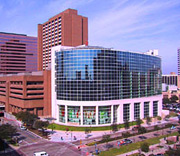Doctors Caution to Guard Your Heart on Super Bowl Sunday
Houston, Texas (February 4, 2010) – Doctors at the Texas Heart Institute at St. Luke's Episcopal Hospital echoed cautions featured this week in the New York Times that Super Bowl Sunday can be a hazardous time for people with heart trouble.
"We want people to end the football season with a bang and enjoy the big game, but we also want them to be aware that heart disease knows no season," said Pranav Loyalka, MD, a THI cardiologist.
The Times article cited a study in The New England Journal of Medicine that followed thousands of German fans during the 2006 World Cup, finding that "cardiac emergencies surged on days the German team played, especially after dramatic games."
Also mentioned was a study published in the American Journal of Cardiology in which a team of scientists last year focused on Los Angeles residents during past years when local teams were in the Super Bowl. Among that study's findings was that deaths from heart attacks rose in Los Angeles on the day the local team, the Rams, lost the Super Bowl and for two weeks afterward.
Aside from stress, the Times noted that, "incautious eating and drinking that mark Super Bowl Sunday may also play a role in cardiovascular trouble."
"It's similar to the holiday season when people often overindulge and postpone their normal activities in favor spending more time on the sofa watching the game," said Dr. Loyalka. "People get so involved in the game and related social activities they often ignore symptoms until it's too late, especially if they have no prior history of heart disease. We want people to be more aware so they'll be around for many more Super Bowls."
The Super Bowl is hosted in February, which is also National Heart Month and includes the annual Wear Red Day observance on Friday, February 5, to raise awareness about women's heart health. Cardiovascular disease remains the number one killer of both men and women in the United States, with about 1.5 million heart attacks occurring each year.
Information about heart health, heart attack warning signs and how to get help for heart problems can be found at www.texasheart.org/hic and at www.stlukeshouston.com.
For media inquiries please contact:
Texas Heart Institute
Frank Michel ♦ 713-218-2210 or 832-355-9246
Email: fmichel@heart.thi.tmc.edu
St. Luke's Episcopal Hospital
Jessica Michan ♦ 832-355-3791
Email: jmichan@stlukeshealth.org
For THI and St. Luke's media profiles, see Public Affairs.



